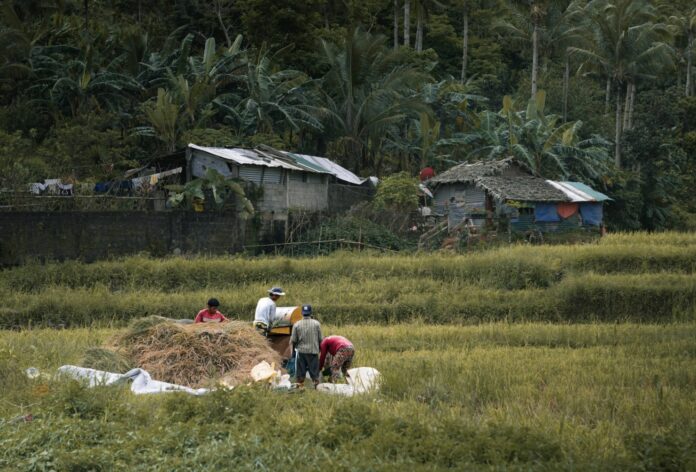By Mary Therese D. Ancheta and Dae Abigael V. Tabilos
LAOAG CITY, Ilocos Norte (PIA) – As climate change continues to threaten farmlands across the province, farmers in Ilocos Norte are turning to low-carbon or green farming practices that promise to protect the environment, reduce production costs, and secure food for future generations.
Through the leadership of the Provincial Government of Ilocos Norte, the Provincial Agriculture Office (PAO) is championing sustainable farming systems that lower greenhouse gas emissions, promote renewable energy use, and strengthen community resilience.
“Low-carbon agriculture is a system for agriculture whose aim is to reduce carbon emissions,” explained Engineer Chonito Baldovi, Engineer III and Provincial High Value Crops Development Program (HVCDP) coordinator.
“These include greenhouse gases such as carbon dioxide from fossil fuels, methane from livestock, and nitrous oxide from inorganic fertilizers.”
Baldovi said his participation in a workshop on low-carbon agriculture in Taiwan-organized by the Taiwan Technical Mission and the International Cooperation and Development Fund (ICDF)-inspired him to help localize similar practices in Ilocos Norte.
From traditional to sustainable farming
For decades, many farmers in the province have relied on traditional methods such as burning crop residues, using large amounts of chemical fertilizers, and depending on diesel-powered machinery – all of which contribute heavily to greenhouse gas emissions.
To address this, the PAO is introducing practical, climate-smart solutions, including:
- Organic farming and composting to reduce dependence on synthetic fertilizers;
- Solar-powered irrigation systems (SPIS) to minimize fossil fuel use in water pumping;
- Alternate wetting and drying techniques in rice fields to conserve water and reduce methane emissions;
- Anti-burning campaigns to discourage the burning of rice straw and crop residues; and
- Training programs for farmers on sustainable soil and water management.
“We train our farmers to produce their own organic fertilizer through composting,” Baldovi said.
“We also provide shredding machines and composting facilities to farmer associations to lessen their reliance on synthetic fertilizers.”
Across the province, several solar-powered irrigation projects have already been implemented – a clear step toward renewable energy use in agriculture and reduced production costs for farmers.
Partnerships and youth involvement
The provincial government continues to strengthen partnerships with national and international organizations such as the Climate Change Commission, the Department of Agriculture’s Climate-Resilient Agriculture Office, and the Taiwan ICDF to introduce innovative technologies that support low-carbon farming systems.
Equally important, the PAO is investing in the next generation of farmers through the 4-H (head-heart-hands-health) Clubs and young farmers’ training programs, ensuring that sustainability becomes part of daily life.
“The youth should be educated because they will benefit if we address climate change early,” Baldovi emphasized.
“We teach them organic farming and urban gardening so they can practice sustainability even in small spaces.”
By engaging the youth, Ilocos Norte is cultivating not just crops but a new generation of environmentally aware and empowered food producers.
Local innovations, agricultural cooperation
Ilocos Norte is also expanding its agricultural cooperation through demonstration projects featuring Taiwan garlic varieties in municipalities such as Badoc, Paoay, San Nicolas, Piddig, Bangui, Burgos, Pasuquin, Baccara, and Adams.
These projects aim to boost local garlic yield and strengthen the province’s garlic industry while preserving Ilocano heritage varieties.
Baldovi assured that these initiatives will not replace local garlic strains but will instead complement them to improve productivity and income for local farmers.
Responding to climate impacts
The shift to green and low-carbon agriculture has become more urgent following the P456 million worth of agricultural damages recently recorded in the province due to typhoons.
“Our goal is to help farmers lower production costs while protecting the environment,” Baldovi said.
“If we continue these programs, we can ensure the sustainability of our resources and the well-being of our farmers and fisherfolk.”
Through these efforts, farmers are encouraged to join the “Agri ka Dito” initiative – an open platform by the PAO that provides direct access to training, farm inputs, and technical assistance.
“Just coordinate with our office,” Baldovi assured.
“We will help you lower production costs, increase yield, and improve your livelihood. The provincial government is very supportive.”
Interested farmers may visit their Municipal Agriculture Office or the Provincial Agriculture Office in Laoag to participate in the “Agri ka Dito” program.
Building a low-carbon future
Ilocos Norte’s journey toward green and climate-smart agriculture shows that sustainability begins with people – from the farmers tending their fields to the youth cultivating small gardens in their homes.
Through innovation, education, and strong partnerships, the province is proving that it is possible to feed communities while healing the planet.
By working together, Ilocanos are not only reducing their environmental footprint but also building a future where farming remains both a livelihood and a legacy. (AMB/MTDA/DAVT, PIA Ilocos Norte)
